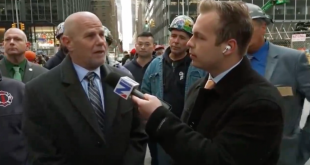MILWAUKEE — Wisconsin voters on Tuesday chose to upend the political direction of their state by electing a liberal candidate to the State Supreme Court, flipping majority control from conservatives, according to The Associated Press. The result means that in the next year, the court is likely to reverse the state’s abortion ban and end the use of gerrymandered legislative maps drawn by Republicans.
Janet Protasiewicz, a liberal Milwaukee County judge, defeated Daniel Kelly, a conservative former Wisconsin Supreme Court justice who sought a return to the bench. With 90 percent of votes counted, Judge Protasiewicz led by 10 percentage points.
“Our state is taking a step forward to a better and brighter future where our rights and freedoms will be protected,” she told jubilant supporters at her victory party in Milwaukee.
The contest, which featured over $40 million in spending, was the most expensive judicial election in American history. Early on, Democrats recognized the importance of the race for a swing seat on the top court in one of the country’s perennial political battlegrounds. Millions of dollars from out of state poured into Wisconsin to back Judge Protasiewicz, and a host of national Democratic groups rallied behind her campaign.
Judge Protasiewicz, 60, shattered long-held notions of how judicial candidates should conduct themselves by making her political priorities central to her campaign. She made explicit her support for abortion rights and called the maps, which gave Republicans near-supermajority control of the Legislature, “rigged” and “unfair.”
Her election to a 10-year term for an officially nonpartisan seat gives Wisconsin’s liberals a 4-to-3 majority on the court, which has been controlled by conservatives since 2008. Liberals will hold a court majority until at least 2025, when a liberal justice’s term expires. A conservative justice’s term ends in 2026.
As the race was called Tuesday night, the court’s three sitting liberal justices embraced at Judge Protasiewicz’s election night party in Milwaukee, as onlookers cried tears of joy. During her speech, the judge and the other three liberal justices clasped their hands together in the air in celebration.
“Today’s results mean two very important and special things,” Judge Protasiewicz said. “First, it means that Wisconsin voters have made their voices heard. They have chosen to reject partisan extremism in this state. And second, it means our democracy will always prevail.”
Justice Kelly, 59, evinced the bitterness of the campaign with a testy concession speech that acknowledged his defeat and portended doom for the state. He called his rival’s campaign “truly beneath contempt” and decried “the rancid slanders that were launched against me.”
“I wish that I’d be able to concede to a worthy opponent, but I do not have a worthy opponent,” Justice Kelly told supporters in Green Lake, Wis. He had not called Judge Protasiewicz by the time she delivered her victory remarks.
He concluded the final speech of his campaign by saying, “I wish Wisconsin the best of luck, because I think it’s going to need it.”
Judge Protasiewicz made a calculation from the start of the race that Wisconsin voters would reward her for making clear her positions on abortion rights and the state’s maps — issues most likely to animate and energize the base of the Democratic Party.
In an interview at her home on Tuesday before the results were known, Judge Protasiewicz (pronounced pro-tuh-SAY-witz) attributed her success on the campaign trail to the decision to inform voters of what she called “my values,” as opposed to Justice Kelly, who used fewer specifics about his positions.
“Rather than reading between the lines and having to do your sleuthing around like I think people have to do with him, I think I would rather just let people know what my values are,” she said. “We’ll see tonight if the electorate appreciates that candor or not.”
Over the last dozen years, the court has served as an important backstop for Wisconsin Republicans. It certified as constitutional Gov. Scott Walker’s early overhauls to state government, including the Act 10 law that gutted public employee unions, as well as voting restrictions like a requirement for a state-issued identification and a ban on ballot drop boxes.
In 2020, Wisconsin’s Supreme Court was the only one in the country to agree to hear President Donald J. Trump’s challenge to the presidential election. Mr. Trump sought to invalidate 200,000 ballots from the state’s two largest Democratic counties. The Wisconsin court rejected his claim on a 4-to-3 vote, with one of the conservative justices siding with the court’s three liberals on procedural grounds.
That key vote gave this year’s court race extra importance, because the justices will weigh in on voting and election issues surrounding the 2024 election. Wisconsin, where Mr. Trump’s triumph in 2016 interrupted a string of Democratic presidential victories going back to 1988, is set to again be ferociously contested.
The court has acted in Republicans’ interest on issues that have received little attention outside the state.
In 2020, a year after Gov. Tony Evers, a Democrat, succeeded Mr. Walker, conservative justices agreed to limit his line-item veto authority, which generations of Wisconsin governors from both parties had used. Last year, the court’s conservatives allowed a Walker appointee whose term had expired to remain in office over Mr. Evers’s objection.
Once Judge Protasiewicz assumes her place on the court on Aug. 1, the first priority for Wisconsin Democrats will be to bring a case to challenge the current legislative maps, which have given Republicans all but unbreakable control of the state government in Madison.
Jeffrey A. Mandell, the president of Law Forward, a progressive law firm that has represented Mr. Evers, said he would file a legal request for the Supreme Court to hear a redistricting case the day after Judge Protasiewicz is seated.
“Pretty much everything problematic in Wisconsin flows from the gerrymandering,” Mr. Mandell said in an interview on Tuesday. “Trying to address the gerrymander and reverse the extreme partisan gerrymandering we have is the highest priority.”
The state’s abortion ban, which was enacted in 1849, seven decades before women could vote, is already being challenged by Josh Kaul, Wisconsin’s Democratic attorney general. This week, a circuit court in Dane County scheduled the first oral arguments on Mr. Kaul’s case for May 4, but whichever way a county judge rules, the case is all but certain to advance on appeal to the State Supreme Court later this year.
Dan Simmons contributed reporting from Green Lake, Wis.
 Top Naija News: Nigerian News, Breaking News Nigeria and World News Top Naija News is a daily news publication in Nigeria, delivering the latest breaking news in Nigeria and around the world.
Top Naija News: Nigerian News, Breaking News Nigeria and World News Top Naija News is a daily news publication in Nigeria, delivering the latest breaking news in Nigeria and around the world.



